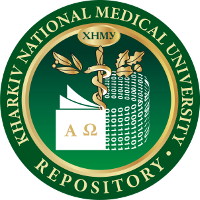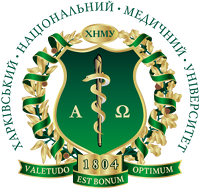Please use this identifier to cite or link to this item:
http://repo.knmu.edu.ua/handle/123456789/32638Full metadata record
| DC Field | Value | Language |
|---|---|---|
| dc.contributor.author | Honchar, Oleksii | - |
| dc.contributor.author | Гончарь, Олексій Володимирович | - |
| dc.date.accessioned | 2023-10-19T17:49:40Z | - |
| dc.date.available | 2023-10-19T17:49:40Z | - |
| dc.date.issued | 2023-06 | - |
| dc.identifier.citation | Honchar O. Cardiac remodeling in hypertensive patients with COVID-19: pre-discharge assessment and a 1-month follow-up / O. Honchar // Journal of Hypertension. ─ 2023. ─ Vol. 41, e-Supplement 3. ─ P. e192─e193. ─ DOI: 10.1097/01.hjh.0000940884.58652.7a. | en_US |
| dc.identifier.uri | http://repo.knmu.edu.ua/handle/123456789/32638 | - |
| dc.description | Honchar, Oleksii. Cardiac remodeling in hypertensive patients with COVID-19: pre-discharge assessment and a 1-month follow-up. Journal of Hypertension 41(Suppl 3):p e192-e193, June 2023. | DOI: 10.1097/01.hjh.0000940884.58652.7a | en_US |
| dc.description.abstract | Objective: To study the impact of hypertension on the formation of structural and functional cardiac changes during hospitalization for COVID-19 and the dynamics of detected changes in the early post-discharge period. Design and method: 212 hospitalized COVID-19 patients (mean age 53.4+-13.6 years, 53% female) underwent comprehensive transthoracic echocardiographic examination and the 6-minute walk test at the baseline 1-2 days prior to discharge and after 31 days of follow-up, being compared to 88 matched controls. Results: COVID-19 patients had increased absolute (10.1 ± 1.5 vs 9.1 ± 0.9 mm, p < 0.001) and relative LV walls thickness (0.45 ± 0, 07 vs 0.39 ± 0.04, p < 0.001), LV myocardial mass index (38.1 ± 8.9 vs 33.9 ± 5.8 g/m2.7, p < 0.001) and left atrial volume index (28.6 ± 6.6 vs 25.1 ± 4.9 ml/m2, p < 0.001), as well as decrease in LV global longitudinal strain (-17.5 ± 2.4 vs -18.6 ± 2, 2%, p < 0.001) and diastolic filling parameters (e’ 9.2 ± 2.2 vs 11.3 ± 2.6 cm/s, p < 0.001; E/e’ 7.5 ± 1.8 vs 6.8 ± 1.7, p = 0.002). The observed changes were more pronounced in the cohort of hypertensive participants, but also persisted among normotensive patients, resulting in a high prevalence of concentric LV geometry (78% and 43%, respectively, p < 0.001 between groups and vs control), predominantly grade I diastolic dysfunction (51% and 25%, p < 0.001 between groups and vs control), and abnormal values of global longitudinal strain (32% and 19%, p = 0.027 between groups, p < 0.001 vs control), all of which persisted throughout 1-month follow-up. The increase in the % of predicted 6-minute walk distance was 11.2 ± 7.5 in hypertensives vs 12.8 ± 7.6 in non-hypertensive participants, p > 0.05. Conclusions: Hospitalised COVID-19 patients at the pre-discharge period were characterized by the high prevalence of LV concentric geometry and diastolic dysfunction, as well as the minor decrease of its longitudinal contractility, which were more pronounced in the presence of concomitant hypertension and did not improve during 1 month of follow-up. | en_US |
| dc.language.iso | en | en_US |
| dc.title | Cardiac remodeling in hypertensive patients with COVID-19: pre-discharge assessment and a 1-month follow-up | en_US |
| dc.type | Thesis | en_US |
| Appears in Collections: | Наукові праці. Кафедра пропедевтики внутрішньої медицини № 1, основ біоетики та біобезпеки | |
Files in This Item:
| File | Description | Size | Format | |
|---|---|---|---|---|
| Abstracts 498-500.pdf | 1,14 MB | Adobe PDF | View/Open |
Items in DSpace are protected by copyright, with all rights reserved, unless otherwise indicated.

